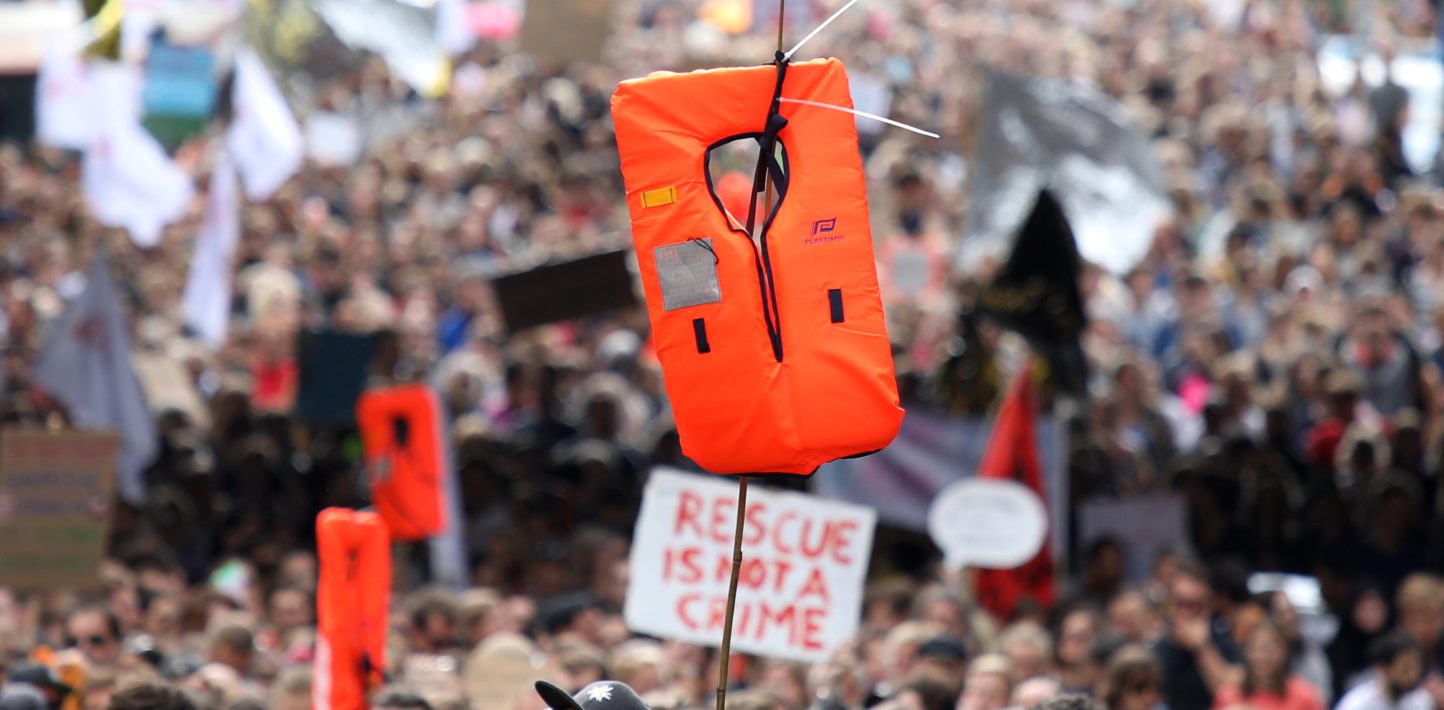Helping other people is normal. And it is the right thing to do.
For me helping is normal. I didn’t know that helping was forbidden. Helping is my duty, as a human being.
Valerie
What is the problem?
In recent years, compassion has been turned into a crime across Europe. People who have helped refugees and migrants have been threatened, smeared, intimidated, harassed, and dragged through the courts to face punishment simply for helping others in need.
When authorities punish and criminalize simple acts of humanity, our common dignity is under attack.
How big is the problem?
Across Europe, hundreds of people are being punished just for helping or showing solidarity with those in need. Dozens of prosecutions have been launched against NGOs and individuals in Italy, Greece, France and Switzerland.
Who is affected?
The criminalization of solidarity affects civil society organizations and individuals across Europe, including pensioners, mountain guides, priests, young activists, boat captains and more. It also affects refugees and migrants who dare to help other people on the move.
Learn more. Read our report and executive summary
Executive Summaries
Sarah and Seán’s story
We volunteered to assist those in need. We could spend 25 years in jail for aiding survivors, but if you ask me now if I would change anything, knowing that my life could be turned upside down, I am telling you that I would do the exact same thing
Sarah Mardini
Sarah and Seán met when they volunteered together as trained rescue workers in Lesvos, Greece. Sarah is a refugee from Syria. Her journey to Europe made international news. She and her sister saved 18 people by dragging their sinking boat to safety. With her friend, Séan Binder, a young deep-sea diver from Germany living in Ireland, they patrolled Lesvos spotting boats in distress. They decided to volunteer as they couldn’t watch people drown and do nothing.
Their humanitarian work helped many refugees, but like others across Europe, they are being criminalised. They are facing up to 25 years in prison on ‘people smuggling’ charges. They already spent more than 100 days in prison before being released on bail in December 2018.
What is being criminalized?
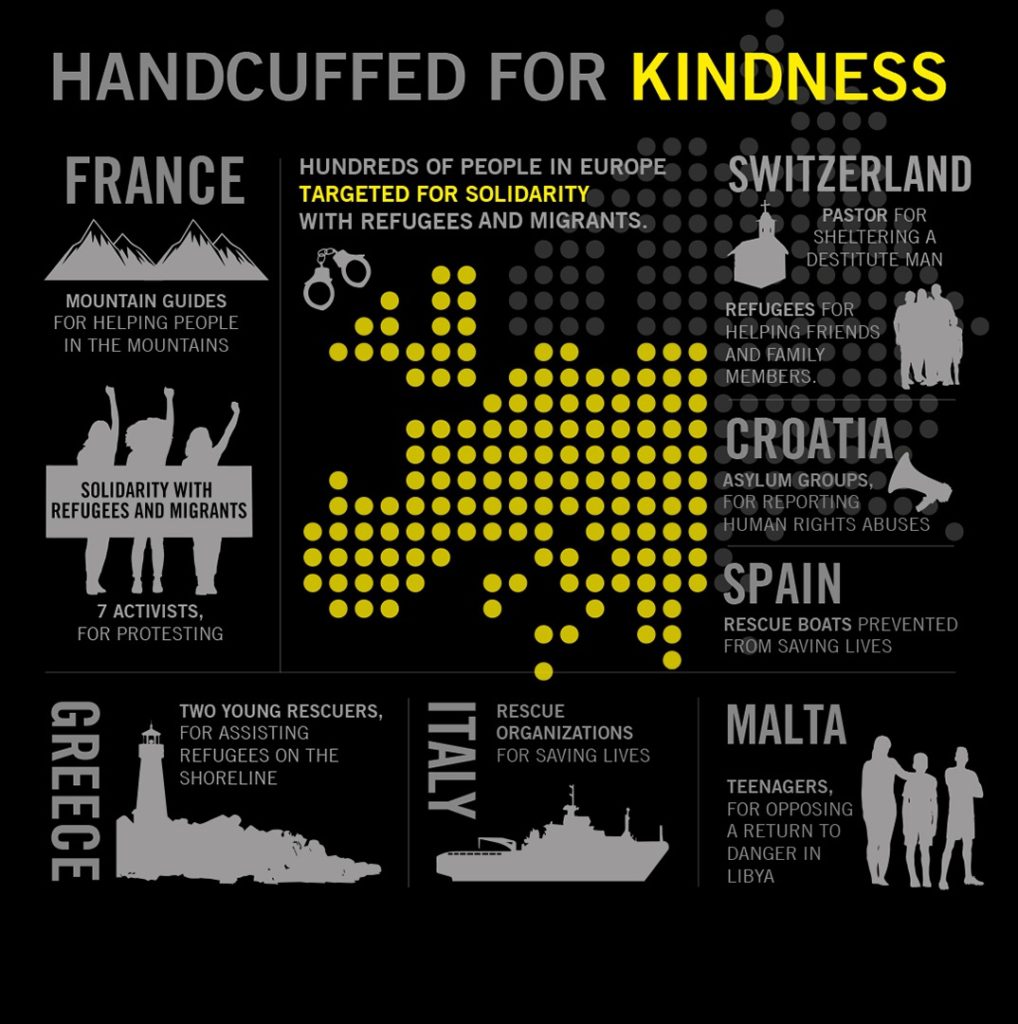
- Giving water to people arriving on the shoreline
- Giving food
- Giving hot tea
- Providing shelter
- Giving exhausted people a lift
- Tweeting
- Helping people in the mountains
- Taking children to the Police station
- Flashing the lights of a car
- Informing people about their rights
- Alerting the Coast Guard about people drowning at sea
- Rescuing lives at sea
- Monitoring and reporting human rights violations
- Protesting against returns to detention and torture
- Demonstrating peacefully
- Stopping a deportation flight
The list shows just some examples of cases that Amnesty has documented, where actions that provide help to people in need are being criminalized by different European governments.
How are they being criminalised?
Governments are using a range of measures to target solidarity such as:
- Smear campaigns
- Repressive laws
- Code of Conduct for NGOs that can result in delayed rescues at sea
- Criminal investigations
- baseless charges to drag them through the courts
- Police harassment and intimidation
- Fines
- Entry bans into a country
Governments are mis-using anti-smuggling and counter-terrorism legislation to curb solidarity.
It is unjust and inhumane to have to risk imprisonment for saving lives at sea…
Saving lives at sea
Rescuers have experienced smear campaigns and criminal investigations. NGO boats have been blocked in port or impounded, leaving fewer boats available to save people from drowning.
In Spain, the government arbitrarily blocked two rescue boats for months, preventing them from saving lives in the Central Mediterranean.
In Italy, rescue NGOs have been forced to follow a “Code of Conduct” that can delay rescues and have been investigated just for saving lives. Things got even worse in 2019, as Italy closed ports and passed legislation banning NGOs from entering its territorial waters or risk fines.
In Greece, trained rescuers were in pre-trial detention for months, after Greek authorities arrested them for assisting refugees arriving on the island of Lesvos.
The Iuventa 10
On 2 August 2017, Italian prosecutors ordered the seizure of the Iuventa, the ship of German rescue NGO Jugend Rettet. Since then, despite having rescued 14,000 people, 10 members of the crew -the “Iuventa 10”- remain under investigation for facilitating the irregular entry of refugees and migrants in relation to three separate rescue operations that happened in 2016 and 2017
The independent organisation Forensic Architecture has reconstructed the events and gathered evidence showing that the Iuventa crew were saving lives.
The Iuventa 10 have been in a limbo for two and half years, their lives on hold due to the a pending criminal trial. Amnesty calls for the investigation to be dropped
Elisa de Pierri, Amnesty International Researcher
El Hiblu
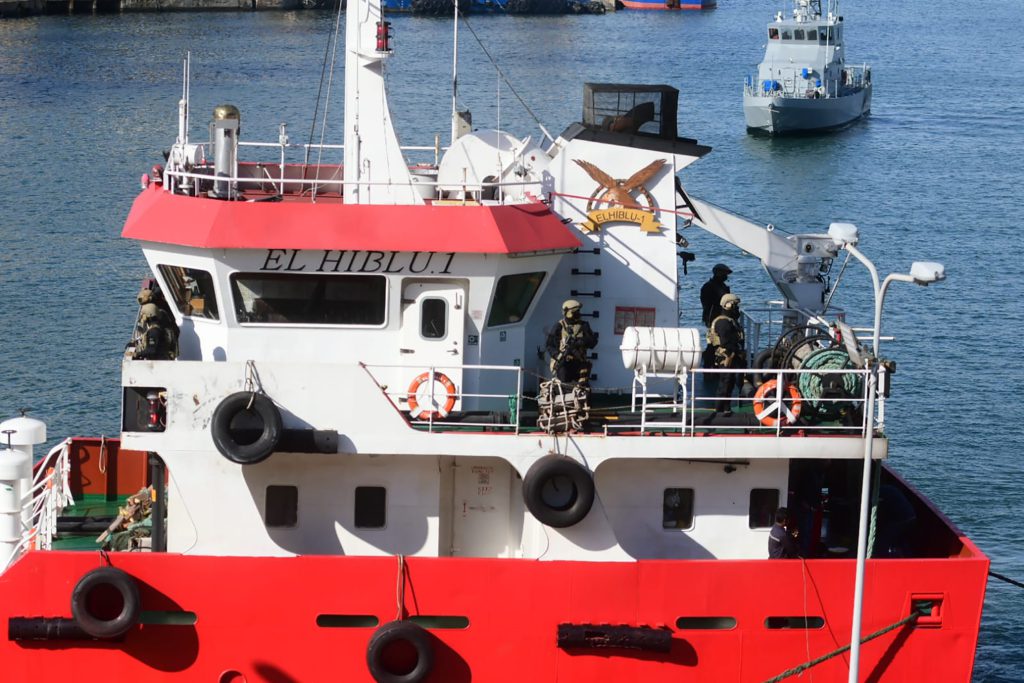
In Malta, three teenage asylum-seekers are being prosecuted on serious charges that could carry life sentences, simply for daring to stand up to the unlawful attempt of a captain to take them and other 100 rescued people back to Libya. In Libya, they were at real risk of suffering unspeakable abuses, including being held in inhumane conditions in a detention centre, extortion, torture and other ill-treatment.
Amnesty calls on the Maltese authorities to drop disproportionate charges against the youths involved in the El Hiblu 1, who were trying to protect themselves and the other rescued people.
Solidarity is helping someone to preserve their dignity
Luigi Chiampo, Parish Priest of Bussoleno
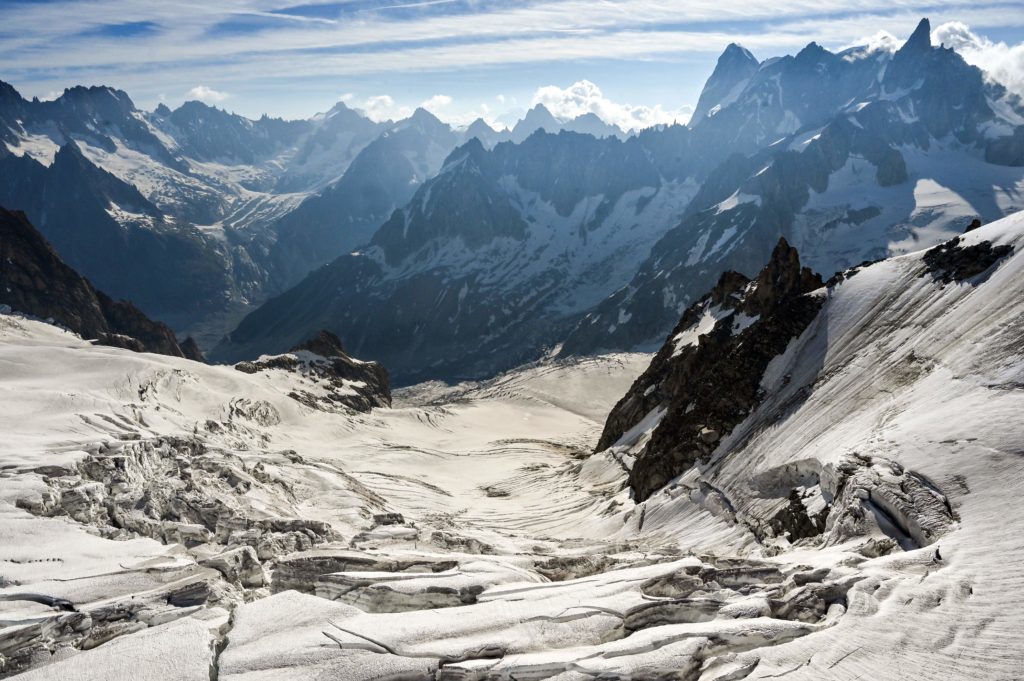
Helping people in the mountains
In the snowy Alps, at the French- Italian border, a solidarity network tries to prevent the deaths of refugees and migrants crossing from Italy to France. People from the network try to ensure that the refugees and migrants are fully aware of the risks, give them maps, sturdy shoes and warm clothes to keep safe in the mountains, and assist those who get lost and need to be brought back to safety.
Cristina, a volunteer from Socorsso Alpino said, “For me, helping is part of my love for the mountain. Solidarity is to care for others. In the Susa Valley, we are a family helping each other.”
In the French part of the border, in the village of Briançon, people have organized outings to the mountains, on ski or on foot, to search for refugees and migrants who may need help.
In the Italian part of the border, acts of solidarity are supported by authorities but on the French side, these same acts, are punished.
Mountain guide Pierre Mumber had to face trial for “facilitating the irregular entry” of West African asylum-seekers just for offering them hot tea and warm clothes. He was eventually acquitted on appeal.
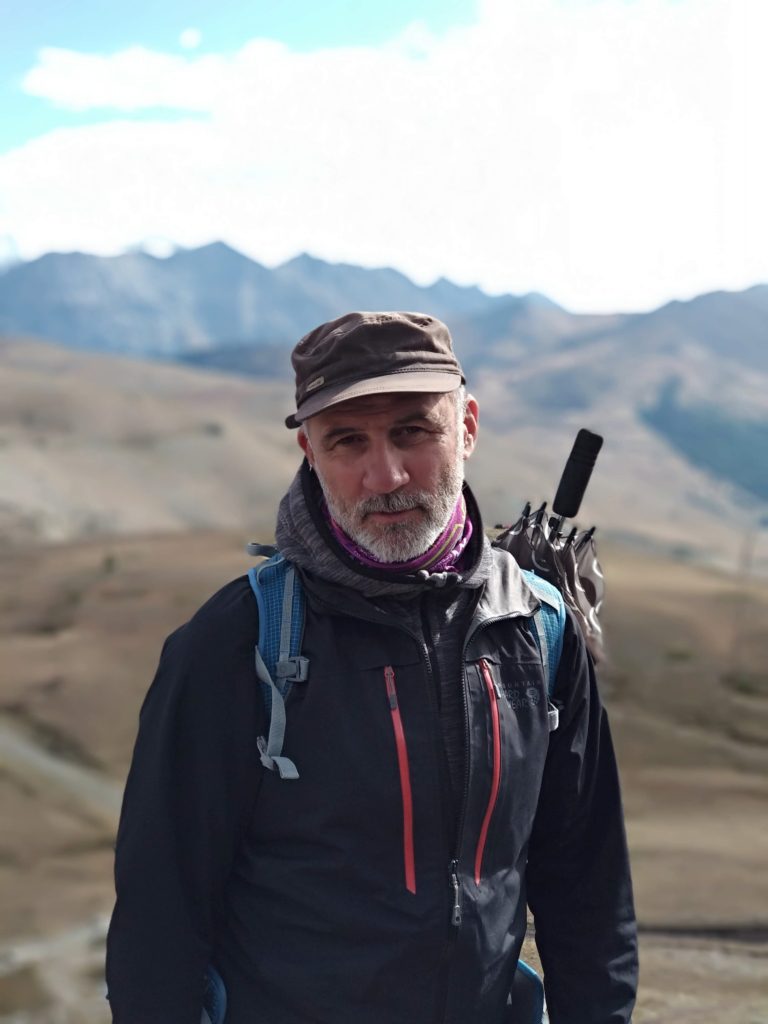
When you see an exhausted person who cannot walk, you give that person your hand
Pierre Mumber
Other solidarity actions have also been criminalized. Seven protesters were convicted for participating in a spontaneous march against the presence of an anti-migrants group, which had arrived in the area of Briançon in April 2018, creating a climate of fear. During the protest, a migrant entered France irregularly, allowing authorities to misuse the charge of facilitation of irregular entry to crack down on the protest.
Helping people in acute distress
People in Switzerland, including a pastor, have been prosecuted and convicted simply for sheltering or helping refugees to access protection. Migrants and refugees have also been prosecuted for helping friends and family members.
… I am very modest, I do not ask for the moon… Vulnerable people, and those with family, should not be expelled
Anni Lanz
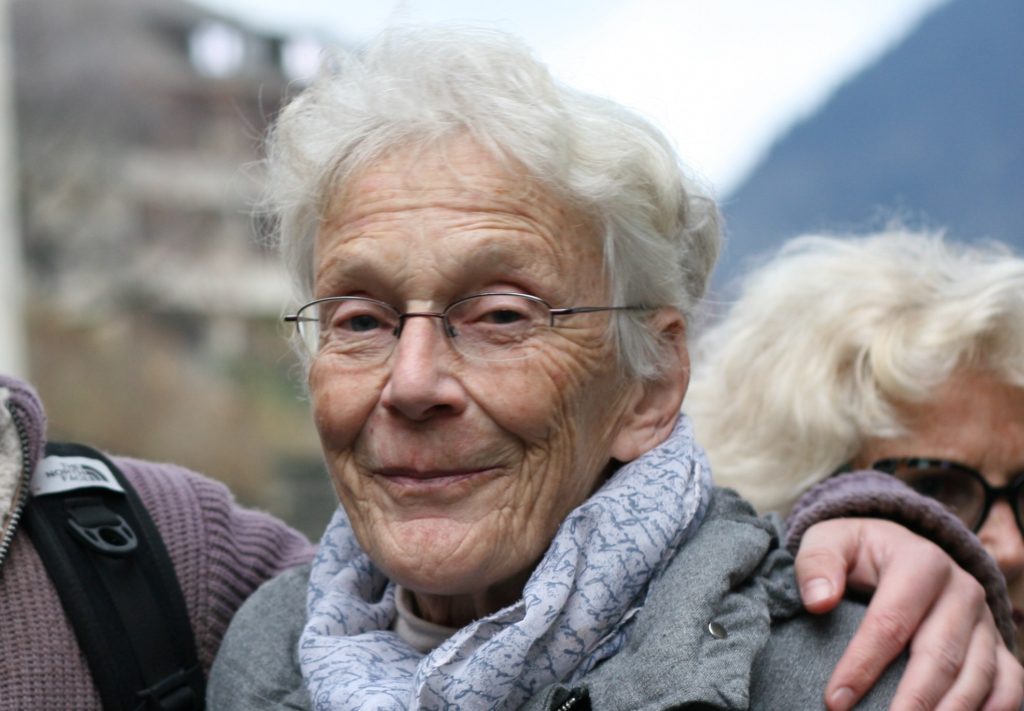
Anni Lanz, a 73-year-old woman who has defended refugee rights for more than three decades, was convicted and fined for giving a homeless frost-bitten Afghan asylum seeker a lift over the Italian border into Switzerland. Anni knew the man was desperate to be with his sister in Switzerland and had a serious mental health condition after the death of his wife and child.
Why is this happening?
Governments across the region have placed an increased focus on limiting and deterring arrivals in Europe. This has meant that helping refugees and migrants in distress is seen as a threat and considered a crime.
The chilling effect and consequences where European countries fail to meet the basic needs of refugees and migrants it is often left to ordinary people to provide food, shelter and support. By punishing the people who step up to fill the gaps, European governments are putting refugees and migrants at even greater risk.
When authorities prosecute the helpers, they create a hostile environment, deterring other people from showing solidarity and assisting refugees and migrants.
Faced with fines and legal fees, human rights defenders and NGOs being criminalized are forced to divert time and resources from their humanitarian work to defend themselves against baseless charges.
Humanitarian work isn’t criminal, nor is it heroic; by elevating humanitarianism to heroism, not helping is at risk of being normalised. Helping others should be absolutely normal
Seán Binder
How can we stop this?
Authorities must stop criminalizing human rights defenders and ensure that people are free and safe to help others.
European authorities must drop charges against those who have done nothing else than helping and standing in solidarity with refugees and migrants. Authorities must stop misusing flawed smuggling laws against individuals who are acting out of humanity to help those in need.
European governments could do this by changing laws to ensure that only those who obtain a material benefit will be prosecuted.
Solidarity must be celebrated, not punished.
What can you do?
Join our movement. People should be free to help. You can help by:
- Taking action
- Talking to your friends about the problems of criminalizing solidarity
- Sharing the infographic
- Sharing this page
- Organizing an event to raise awareness
- Supporting organizations that are providing support to refugees and migrants
- Putting pressure on your government and parliament to take action


